A list of commemorative dates and historical events which are significant in terms of Australia’s national identity and culture. These are dates which are celebrated or commemorated Australia-wide (or have been in the past), or which are significant to Australia’s historical development.
* Days which are only generally related to Australia (e.g. Christian holidays) are marked with an asterisk*.
* 1 January: New Year’s Day
 The first day of the year is New Year’s Day. Traditionally, it is a time when people make “New Year’s resolutions”, making plans about ways in which they can improve their lives during the year.
The first day of the year is New Year’s Day. Traditionally, it is a time when people make “New Year’s resolutions”, making plans about ways in which they can improve their lives during the year.
The first of January is also the anniversary of the founding of the Australian Commonwealth on the 1st of January 1901.
26 January: Australia Day
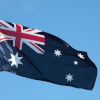 Australia Day, the 26th of January, is the anniversary of the foundation of the British colony at Sydney, New South Wales, in 1788.
Australia Day, the 26th of January, is the anniversary of the foundation of the British colony at Sydney, New South Wales, in 1788.
In early years it was commemorated as the First Landing day, then as Anniversary Day, then as Foundation Day. It was also known as ANA Day, due to the campaigning by the Australian Natives’ Association for the day to be commemorated as a national holiday.
Australia Day is widely celebrated every year as a commemoration of the foundation of the Australian nation.
* 14 February: Valentine’s Day
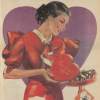 Valentine’s Day is traditionally a special day when one should celebrate romance with one’s partner, or to express one’s romantic feelings. It was originally a Christian feast day to commemorate Saint Valentine. Valentine’s Day is the perfect time to show your appreciation of your loved one. Traditionally, gifts of chocolates, flowers, and/or cards are given (a card with some poetry about love might be appreciated).
Valentine’s Day is traditionally a special day when one should celebrate romance with one’s partner, or to express one’s romantic feelings. It was originally a Christian feast day to commemorate Saint Valentine. Valentine’s Day is the perfect time to show your appreciation of your loved one. Traditionally, gifts of chocolates, flowers, and/or cards are given (a card with some poetry about love might be appreciated).
25 April: Anzac Day
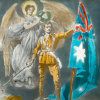 Anzac Day is commemorated on the anniversary of the landing of the Australian and New Zealand Army Corps (ANZAC) on Gallipoli Peninsula, on the 25th of April 1915. The Anzacs, along with military forces from several other Allied countries, fought against the Turks (who were part of the Ottoman Empire), as part of the First World War (1914-1918).
Anzac Day is commemorated on the anniversary of the landing of the Australian and New Zealand Army Corps (ANZAC) on Gallipoli Peninsula, on the 25th of April 1915. The Anzacs, along with military forces from several other Allied countries, fought against the Turks (who were part of the Ottoman Empire), as part of the First World War (1914-1918).
Anzac Day is commemorated across Australia every year, to recognise the effort and sacrifice made by the Australian military forces, and as a show of respect for Australia’s past and present military veterans.
* 1 May: May Day
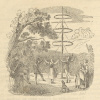 May Day has long been observed in European cultures, as a celebration of the first day of summer, as well as being connected with notions of romance and fertility. Public celebrations have included dancing around the Maypole and the crowning of a Queen of May.
May Day has long been observed in European cultures, as a celebration of the first day of summer, as well as being connected with notions of romance and fertility. Public celebrations have included dancing around the Maypole and the crowning of a Queen of May.
In modern times, May Day has been associated with the celebrations of labour movements, although those events are distinct from the traditional May Day festivities.
* Second Sunday in May: Mother’s Day
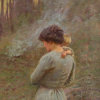 Mother’s Day is when people show their appreciation to their mothers, not just for giving birth to them, but especially for all of the good work and tiring effort carried out by mothers in raising and providing for their children.
Mother’s Day is when people show their appreciation to their mothers, not just for giving birth to them, but especially for all of the good work and tiring effort carried out by mothers in raising and providing for their children.
1 September: Wattle Day
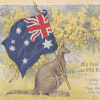 Wattle Day is a patriotic event which celebrates the first day of spring, encourages an appreciation for Australian flora, and aims to encourage national sentiment. Wattle Day provides a way for Australians to promote a homegrown symbol of their nationality. People may choose to wear a sprig of wattle, or (in order to preserve our wattle trees from being damaged) to wear a wattle symbol (such as a badge with a wattle image, or some other representation of the Wattle Day idea).
Wattle Day is a patriotic event which celebrates the first day of spring, encourages an appreciation for Australian flora, and aims to encourage national sentiment. Wattle Day provides a way for Australians to promote a homegrown symbol of their nationality. People may choose to wear a sprig of wattle, or (in order to preserve our wattle trees from being damaged) to wear a wattle symbol (such as a badge with a wattle image, or some other representation of the Wattle Day idea).
* First Sunday in September: Father’s Day
Father’s Day is when people show their appreciation to their fathers, for all of the good work and tiring effort carried out by fathers in raising and providing for their children.
31 October: Battle of Beersheba commemoration
 To commemorate the Battle of Beersheba, which was a military action fought between Allied forces against troops of the Ottoman Empire in the area in and around the town of Beersheba, in Palestine. The battle took place on the 31st of October 1917, during the First World War (1914-1918). Determined to put an end to the battle, the men of the 4th Australian Light Horse Brigade made a horseback charge against the Turks, which was one of the last cavalry charges of the modern era.
To commemorate the Battle of Beersheba, which was a military action fought between Allied forces against troops of the Ottoman Empire in the area in and around the town of Beersheba, in Palestine. The battle took place on the 31st of October 1917, during the First World War (1914-1918). Determined to put an end to the battle, the men of the 4th Australian Light Horse Brigade made a horseback charge against the Turks, which was one of the last cavalry charges of the modern era.
First Tuesday in November: The Melbourne Cup
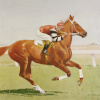 The Melbourne Cup is the most famous horse race in Australia. It began in 1861 and has been held every year since. It is held on the first Tuesday in November. The Cup is a race for thoroughbred horses, three years old and over, with a prize pool of several million dollars.
The Melbourne Cup is the most famous horse race in Australia. It began in 1861 and has been held every year since. It is held on the first Tuesday in November. The Cup is a race for thoroughbred horses, three years old and over, with a prize pool of several million dollars.
Betting on the Melbourne Cup is widespread, with millions of dollars spent in on-track and off-track betting, along with a great part of the population participating in friendly Cup Sweeps organised amongst friends and work colleagues. Melbourne Cup Day is a public holiday in Melbourne and the race is watched by many Australians across the country, being known as “the race that stops a nation”.
11 November: Remembrance Day
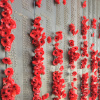 Remembrance Day marks the cessation of hostilities at the end of the First World War (1914-1918), when an armistice was arranged between the Allied Powers and the Central Powers (the day was originally known as Armistice Day). A ceasefire was arranged for 11 a.m. on the 11th day of the 11th month in 1918. In patriotic places it is marked by a minutes’ silence (giving people time to remember, or to solemnly think about, those who fought and died for their country). Although Remembrance Day was originally created to remember those who fought and died in the First World War (1914-1918), it was later expanded to include all wars and military conflicts.
Remembrance Day marks the cessation of hostilities at the end of the First World War (1914-1918), when an armistice was arranged between the Allied Powers and the Central Powers (the day was originally known as Armistice Day). A ceasefire was arranged for 11 a.m. on the 11th day of the 11th month in 1918. In patriotic places it is marked by a minutes’ silence (giving people time to remember, or to solemnly think about, those who fought and died for their country). Although Remembrance Day was originally created to remember those who fought and died in the First World War (1914-1918), it was later expanded to include all wars and military conflicts.
3 December: Battle of the Eureka Stockade commemoration
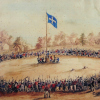 The Eureka Rebellion of 1854 occurred during the “roaring days” of the 1850s gold rushes; the rebellion came about due to the oppressive taxation levied upon miners (in the form of expensive mining licences) and because of the odious way in which searches for those without mining licences were carried out.
The Eureka Rebellion of 1854 occurred during the “roaring days” of the 1850s gold rushes; the rebellion came about due to the oppressive taxation levied upon miners (in the form of expensive mining licences) and because of the odious way in which searches for those without mining licences were carried out.
Several hundred miners rebelled in the Ballarat area, a stockade was erected, and the Battle of the Eureka Stockade occurred when police and troopers attacked the stockade on the morning of the 3rd of December 1854. In the subsequent Eureka trials, juries in Melbourne acquitted all of the accused rebels.
The Eureka Rebellion is regarded as playing an important role in the granting of democratic liberties in Australia.
* 25 December: Christmas Day
 As a day commemorating the birth of Jesus Christ, Christmas Day is very important to those of the Christian faith. However, the event encompasses more than Christianity, as this celebratory day predates Christianity, with pagan festivals being held in European countries to celebrate the winter solstice; therefore, Christmas Day can be widely celebrated, whether one is of the Christian faith or not. As a cultural event, many people use Christmastime as an opportunity to catch up with family and friends, exchange gifts, eat a hearty meal together, and be of good cheer.
As a day commemorating the birth of Jesus Christ, Christmas Day is very important to those of the Christian faith. However, the event encompasses more than Christianity, as this celebratory day predates Christianity, with pagan festivals being held in European countries to celebrate the winter solstice; therefore, Christmas Day can be widely celebrated, whether one is of the Christian faith or not. As a cultural event, many people use Christmastime as an opportunity to catch up with family and friends, exchange gifts, eat a hearty meal together, and be of good cheer.
The Ashes
 The Ashes is a cricket competition played between Australia and England. It has been an ongoing event since 1882, the year in which an Australian cricket team beat the English team at Kennington Oval.
The Ashes is a cricket competition played between Australia and England. It has been an ongoing event since 1882, the year in which an Australian cricket team beat the English team at Kennington Oval.
The origin of “the Ashes”, as a term, comes from a humorous “obituary”, regarding the English team’s loss, placed in The Sporting Times (London), which mourned the death of English cricket. As a further extension on the joke, when the English cricket team came to Australia, a small terracotta urn containing “The Ashes” was presented to the English team’s captain.
This page is under construction, as there are more commemorative dates yet to be added.
Updated 26 December 2023
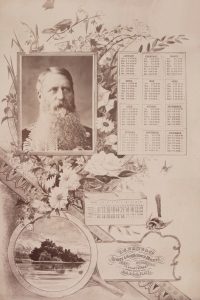

Leave a Reply